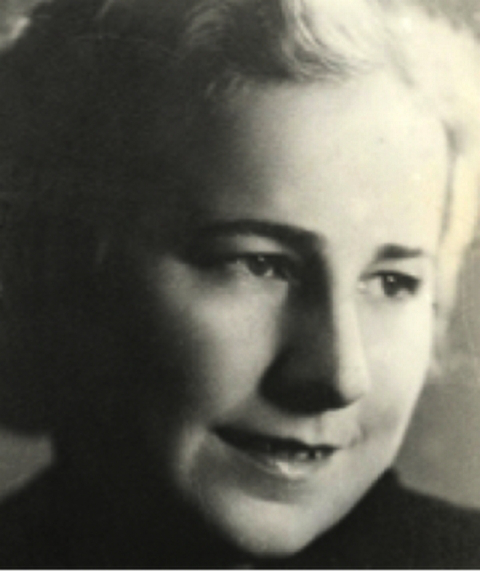Antonia (Toni) Bruha, née Spath
- 03. 1915 (Vienna) - 27. 12. 2006 (Vienna)
Hairdresser, student of Slavic studies, after liberation: documentary, archivist at the DÖW
Ravensbrück: 02. October 1942 – 28. April 1945
Autobiography "I Was Not a Hero"

Antonia (Toni) Bruha, Wien, Privatarchiv Familie Bruha
Toni was politically influenced by her socialist-thinking father and the pacifist attitude of Quakers with whom she came into contact during her vocational training. Her mother came from Bohemia.
She met her future husband at the “Czech Workers' Club”. They married in 1935.
In the same year, both began to organize in the resistance. Together they ensured the distribution of the illegal Austrian workers' newspaper printed in Brno in Vienna.
From 1938 Toni worked in a large Czech-Slovak resistance organization in the 10th district of Vienna, which stood for a free, democratic Austria. She wrote and distributed leaflets, took part in sabotage campaigns and helped Jews to flee across the border to Switzerland.
An informer betrayed many members of this organization. Toni was arrested in October 1941, three months after the birth of her daughter. At the Gestapo headquarters on Morzinplatz, she was tormented and tortured, and her child was used against her as a means of pressure. She also read her name on a list of the names of those sentenced to death that were presented to her for signature. She thought she was being shot, but was moved to another floor of the prison. From here she was sent to the district prison in Schiffamtsgasse in September 1941.
Together with her friend Irma Trksak, she came to Ravensbrück for transport. Toni initially had to work, pushing the lore, then in the cutting shop, then in the area. From there, she brought drugs to the block at risk of life and saved many a life with other comrades. There she was also exposed to the atrocities that the SS doctors did to the women and children who were handed over to them.
The prisoner staff of the district were in solidarity with each other. This was the only way to get successful rescue operations. Prisoner numbers of deceased people were often exchanged for those of other prisoners who had chances of recovery. Toni was involved in the rescue operation of three Austrian resistance fighters: Toni Lehr, Gerti Schindel and Edith Wexberg.
She also belonged to the illegal international committee, where it was discussed who is supported and in what way. However, only individuals could be helped.
On April 28, 1945, the prisoners were forced to a death march. Toni Bruha, Irma Trksak, Berta Lauscher and others managed to escape and return to Vienna.
Immediately after her return to Vienna in the early summer of 1945, Toni Bruha was one of the authors of the first publication on the "Ravensbrück Women's Concentration Camp". Eleven women from Ravensbrück described the "women's dungeon in Europe". According to the authors, it is a "short, simple report of the immeasurable, inexhaustible suffering that fascism has brought about us". The booklet was published in 1945 by Stern-Verlag Wien.
In 1947 Toni Bruha was one of the founding members of the "Austrian Ravensbrück Camp Community". For many decades she worked on a voluntary basis in the Documentation Archive of the Austrian Resistance (DÖW). She performed tirelessly as a contemporary witness in schools. Her autobiography "I Was Not a Hero" was published in 1984.
Sources: Cristine Cezanne: „Ich bin ganz langsam zu der Stiege gegangen, stolz erhoben das Haupt, innerlich habe ich gezittert“-Antonia Bruha (geb. Spath), in: Helga Amesberger / Brigitte Halbmayr (Hg): „Vom Leben und Überleben – Wege nach Ravensbrück. Das Frauenkonzentrationslager in der Erinnerung“, Band 2 – Lebens-geschichten, 2001 Promedia, Wien, S. 33-41, ISBN 3-85371-176-6